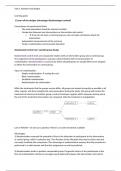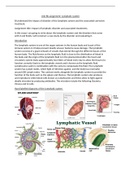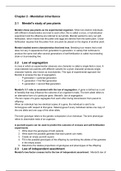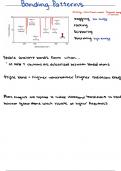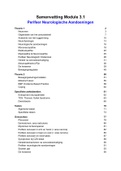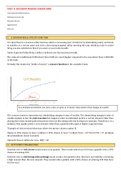Task 1: Random trial designs
Learning goals:
1) Learn all the designs (advantages/disadvantages/content)
Cornerstones of experimental trials:
- The study population should be selected carefully
- Comparison between two interventions or intervention and control
o if you do not have a control group you can not make conclusions about the
intervention
- Independent measurements of the outcome
- Proper randomization and concealed allocation
Randomized control trial / parallel group design
Randomized control trials are comparative studies with an intervention group and a control group.
The assignment of the participant to a group is determined by the formal procedure of
randomization. Randomization is a process by which all participants are equally likely to be assigned
to either the intervention or control group.
Types of randomization:
- Simple randomization tossing the coin
- Block randomization
- Stratified randomization
- Randomization by minimisation
While the treatments that the groups receive differ, all groups are treated as equally as possible in all
other regards, and they complete the same procedures during the study. One group will receive the
treatment of interest and another group a control treatment, against which responses during and at
the end of the treatment intervention are compared. Only the treatment is manipulated.
Law of Helsinki = do not use a placebo if there is an active treatment available
Advantages:
1) Randomization removed the potential of bias in the allocation of participants to the intervention
or control group, which is selection bias. The direction of the allocation bias may be either way and
van easily invalidate the comparison. This advantage of randomization assumes that the procedure is
performed in a valid manner and that the assignment can not be predicted.
2) Randomization tends to produce comparable group. Prognostic factors of the participants at the
time of randomization will be (on average) evenly balanced between the intervention and control
, Task 1: Random trial designs
groups. This does not mean that the baseline variables will be perfectly balances between the two
groups. However, it does mean that for independent covariates, the overall magnitude and direction
of the differences that exist between groups will tend to be equally divides between the two groups.
3) The validity of statistical tests of significance is guaranteed.
Disadvantages:
1) The most frequent objections to use the RCT is about emotional and ethical issues. Many clinicians
feel that they must not deprive a participants from receiving a new therapy or intervention which
they believe to be beneficial.
2) Expensive
3) Less flexible and practical compared to observational studies.
Not all clinical studies can use randomized controls. The prevalence of the disease is zo rare that a
large enough population cannot be readily obtained. In such an instance, case-control studies might
be possible (are not clinical trials).
Zelen design / random consent design
Zelen proposed a modification of the standard randomized control study. Zelen suggested
randomizing eligible participants before informing them about the trial. Only those assigned to active
intervention would be asked if they which to participate. The control participants would simply be
followed and their outcomes monitored.
Disadvantages:
1) This design is not blinded since only the participants of the intervention group are asked form
informed consent; the researchers know in which group the participants belong.
2) Ethical concern of not informing participants that they are enrolled in a trial
The efficiency of this trial depends on the proportion of participants consenting to comply with the
assigned intervention. To compensate for this possible inefficiency, one needs to increase the sample
size.
Cross-over design
The cross-over design is a special case of a randomized control trial and allows each participant to
serve as his own control.
In the two period cross-over design (simplest case), each participant will receive either intervention
or control (A or B) in the first period and the alternative in the succeeding period. The order in which
A and B are given to each participant is randomized.
Learning goals:
1) Learn all the designs (advantages/disadvantages/content)
Cornerstones of experimental trials:
- The study population should be selected carefully
- Comparison between two interventions or intervention and control
o if you do not have a control group you can not make conclusions about the
intervention
- Independent measurements of the outcome
- Proper randomization and concealed allocation
Randomized control trial / parallel group design
Randomized control trials are comparative studies with an intervention group and a control group.
The assignment of the participant to a group is determined by the formal procedure of
randomization. Randomization is a process by which all participants are equally likely to be assigned
to either the intervention or control group.
Types of randomization:
- Simple randomization tossing the coin
- Block randomization
- Stratified randomization
- Randomization by minimisation
While the treatments that the groups receive differ, all groups are treated as equally as possible in all
other regards, and they complete the same procedures during the study. One group will receive the
treatment of interest and another group a control treatment, against which responses during and at
the end of the treatment intervention are compared. Only the treatment is manipulated.
Law of Helsinki = do not use a placebo if there is an active treatment available
Advantages:
1) Randomization removed the potential of bias in the allocation of participants to the intervention
or control group, which is selection bias. The direction of the allocation bias may be either way and
van easily invalidate the comparison. This advantage of randomization assumes that the procedure is
performed in a valid manner and that the assignment can not be predicted.
2) Randomization tends to produce comparable group. Prognostic factors of the participants at the
time of randomization will be (on average) evenly balanced between the intervention and control
, Task 1: Random trial designs
groups. This does not mean that the baseline variables will be perfectly balances between the two
groups. However, it does mean that for independent covariates, the overall magnitude and direction
of the differences that exist between groups will tend to be equally divides between the two groups.
3) The validity of statistical tests of significance is guaranteed.
Disadvantages:
1) The most frequent objections to use the RCT is about emotional and ethical issues. Many clinicians
feel that they must not deprive a participants from receiving a new therapy or intervention which
they believe to be beneficial.
2) Expensive
3) Less flexible and practical compared to observational studies.
Not all clinical studies can use randomized controls. The prevalence of the disease is zo rare that a
large enough population cannot be readily obtained. In such an instance, case-control studies might
be possible (are not clinical trials).
Zelen design / random consent design
Zelen proposed a modification of the standard randomized control study. Zelen suggested
randomizing eligible participants before informing them about the trial. Only those assigned to active
intervention would be asked if they which to participate. The control participants would simply be
followed and their outcomes monitored.
Disadvantages:
1) This design is not blinded since only the participants of the intervention group are asked form
informed consent; the researchers know in which group the participants belong.
2) Ethical concern of not informing participants that they are enrolled in a trial
The efficiency of this trial depends on the proportion of participants consenting to comply with the
assigned intervention. To compensate for this possible inefficiency, one needs to increase the sample
size.
Cross-over design
The cross-over design is a special case of a randomized control trial and allows each participant to
serve as his own control.
In the two period cross-over design (simplest case), each participant will receive either intervention
or control (A or B) in the first period and the alternative in the succeeding period. The order in which
A and B are given to each participant is randomized.

